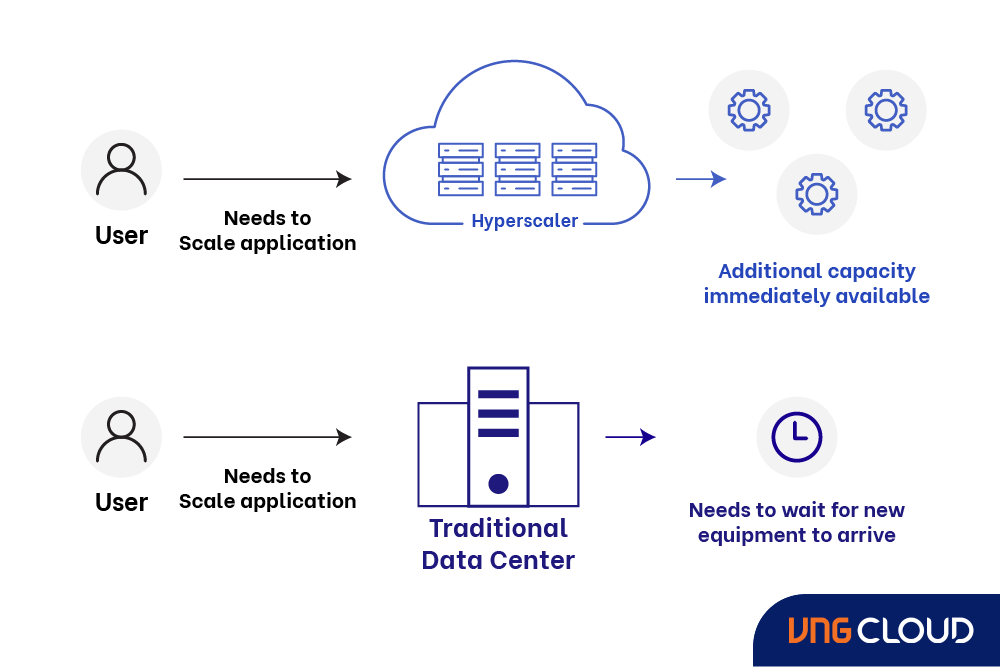Cloud computing has entrenched itself as a fundamental component of today's digital realm. Projections suggest that by 2025, 85% of enterprises will adopt a “cloud-first” approach, prioritizing cloud computing as their core infrastructure. This surge in cloud adoption has led to a proliferation of cloud providers, offering businesses and developers a plethora of choices. However, amidst this array of options, hyperscale cloud providers, characterized by extensive data center networks and comprehensive service offerings, continue to dominate in the cloud market.
What is Hyperscaler?
Hyperscalers are large-scale data centers designed to deliver massive computing power and storage capacity globally. They accommodate extensive demands of millions to billions of users with seamless scalability. Unlike traditional centers, they handle massive workloads while maintaining performance and efficiency. Optimized for agility and scale, they form the core of modern cloud computing.
A Hyperscaler cloud refers to a cloud service provider (CSP), which has a large network of data centers and a wide range of services designed to meet the requirements of enterprise applications serving extensive user bases. Some of the large Hyperscaler clouds in the world include AWS, Google Cloud, and Microsoft Azure.
A hyperscaler's main role is to furnish scalable compute, storage, and network resources to users. They achieve this through an extensive network of servers, storage devices, and network components, which can be orchestrated and scaled on demand to meet user needs.
Hyperscalers are large-scale data centers designed to deliver massive computing power and storage capacity globally.
How Do Hyperscalers Work?
Hyperscalers function by establishing a vast hardware and software infrastructure to serve a large user base. Key to their operation is the scale of their infrastructure, comprising millions of physical servers worldwide. Equipped with high-speed network connections and robust computing and storage resources, they deliver seamless, high-performance computing services globally.
In addition to compute and storage capabilities, hyperscalers offer a wide range of value-added services, including database management, AI, machine learning, big data analytics, security and networking. These services are seamlessly integrated with their core offerings, providing users access to a comprehensive suite of IT services.
Key Characteristics of Hyperscale Architecture
Hyperscalers underpin their immense scale through advanced infrastructure and pioneering technologies. Here's a closer look at their key characteristics:
- Scalable Infrastructure: Hyperscalers feature data centers equipped with extensive servers, storage systems, and networking gear. They swiftly expand resources as demand escalates to ensure seamless service.
- Virtualization: Virtualization, facilitated by hypervisors and containers, fosters data mobility and resource agility within the data center, enabling easy transfer of applications between physical hardware and ensuring flexibility.
- Distributed and Edge Computing: Leveraging distributed computing, tasks are spread across multiple machines, minimizing downtime in case of server failure. Edge data centers further reduce latency by processing data closer to its source, vital for IoT applications.
- Software-defined Networking (SDN): SDN decouples network control from forwarding, enabling centralized management and dynamic resource allocation. This agility helps hyperscalers adapt to evolving network demands efficiently.
- Advanced Load Balancing: Sophisticated load balancers distribute incoming traffic across multiple servers, optimizing response times by preventing server overload.
- AI Integration: Artificial intelligence aids in managing and optimizing operations, from predictive maintenance to real-time resource allocation, ensuring peak efficiency.
- Security Measures: Hyperscalers implement multi-layered security protocols, including physical security measures and advanced cybersecurity solutions, to safeguard critical data.
- Automation and Orchestration: Automation plays a crucial role in managing tasks such as scheduling, monitoring, and workload delivery, enhancing agility and efficiency.
- APIs: Hyperscalers offer APIs enabling users to maximize their platform's capabilities, allowing for automation of common tasks like scaling systems.
- Energy Efficiency and Cooling: Hyperscalers integrate cutting-edge cooling systems and energy-efficient technologies to address their significant energy consumption, often incorporating renewable energy sources for sustainability.
Why Do Companies Leverage Hyperscalers?
Companies use hyperscalers for several reasons. Here are some reasons why:
- Hyperscalers offer massive scale, performance, and reliability.
- They eliminate concerns about infrastructure management, including data center space, power, cooling, and server procurement lead times.
- Hyperscalers remove the need to standardize on specific hardware ecosystems and handle hardware replacement and troubleshooting.
- They are attractive for deploying large-scale applications or services, especially during peak periods like month-end processing or holiday seasons.
- Hyperscalers provide a global footprint, allowing multinational companies to deploy applications in various locations efficiently.
- They are beneficial for big data and analytics, as they can handle massive processing capacity without wasting resources during idle periods, reducing costs over time.

Introducing vColo from VNG Cloud
- Modern Infrastructure: STT VNG Ho Chi Minh City 1 ensures a clean environment, meeting standards by effectively controlling the environment to maintain temperature and humidity within manufacturer-specified ranges. Modern equipment, such as servers, storage hardware, cables, etc.
- High Redundancy: STT VNG Ho Chi Minh City 1 has high redundancy in subsystems, including power systems, air conditioning, heating systems, physical security systems, etc.
- Certifications: STT VNG Ho Chi Minh City 1 holds certifications such as Uptime Tier III for both Design and Facility, and Compliance with international standards including ISO 27017, ISO 27001, ISO 27018, PCI DSS, etc.
- Operations Expert: We are responsible for monitoring operations, maintaining IT equipment and infrastructure, ensuring that your systems/applications operate continuously and efficiently 24/7/365.
With the aspiration to align with global Hyperscaler standards, vColo delivers unparalleled benefits to businesses in terms of performance, reliability, and scalability in their operations. Despite stringent demands for high security and data privacy, our cloud infrastructure stands ready to address these requirements.
Final Thoughts
Hyperscalers are indispensable in the modern digital era, supplying essential computing power and storage capacity to handle the vast volumes of global data. With their diverse service offerings, they play a crucial role in reducing costs and complexity for users, facilitating rapid and efficient organizational growth.
At VNG Cloud, we provide the ideal platform for hyperscale computing, offering a combination of advanced technology, scalability, security, reliability, and cost-effectiveness to meet the needs of modern businesses.